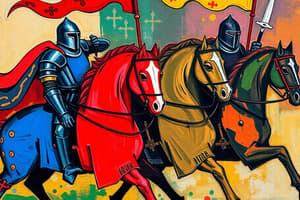Podcast
Questions and Answers
How did the concept of chivalry evolve alongside feudalism?
How did the concept of chivalry evolve alongside feudalism?
- Lords required vassals to protect them in exchange for land and protection, leading to the adoption of a set of rules emphasizing virtues. (correct)
- Chivalry emerged as a way for lords to control their vassals through a strict code of conduct.
- Chivalry was a means for vassals to gain more autonomy and independence from their lords.
- Chivalry had no direct relationship with the feudal system and evolved independently.
What were the primary principles that the chivalry code of knights revolved around?
What were the primary principles that the chivalry code of knights revolved around?
- Loyalty, humility, and courtesy
- Loyalty, honor, and bravery (correct)
- Loyalty, honor, and obedience
- Loyalty, justice, and valor
What were the three factors that defined a knight's honor, according to the chivalric code?
What were the three factors that defined a knight's honor, according to the chivalric code?
- Fighting prowess, loyalty to their lord, and humility.
- Noble birth, wealth, and reputation among their peers.
- Noble birth, obedience to their lord, and bravery in battle.
- Noble birth, fighting prowess, and adherence to moral values. (correct)
How was courage expected to be demonstrated by knights, according to the chivalric code?
How was courage expected to be demonstrated by knights, according to the chivalric code?
How did the origins of chivalry differ between France and Germany?
How did the origins of chivalry differ between France and Germany?
What was the primary purpose of the chivalric code in the feudal system?
What was the primary purpose of the chivalric code in the feudal system?
What was a crucial aspect of the chivalric code for knights?
What was a crucial aspect of the chivalric code for knights?
What role did knights often serve in their communities, according to the chivalric code?
What role did knights often serve in their communities, according to the chivalric code?
According to the chivalric code, how were knights expected to treat others?
According to the chivalric code, how were knights expected to treat others?
Which of the following was NOT a principle emphasized by the chivalric code?
Which of the following was NOT a principle emphasized by the chivalric code?
How did the chivalric code influence the lives of knights?
How did the chivalric code influence the lives of knights?
What does the chivalric code continue to inspire, according to the text?
What does the chivalric code continue to inspire, according to the text?
Flashcards are hidden until you start studying
Study Notes
The Chivalry Code of Knights
Knighthood is often associated with the ideals of chivalry - a code of conduct guiding the behavior of knights. These principles varied throughout history, primarily revolving around loyalty, honor, and bravery. This article explores the various aspects of the chivalry code and how it shaped the training of knights.
Origins of Chivalry
The origins of chivalry can be traced back to the early Christian states of Europe, particularly France and Germany. It evolved alongside feudalism, where lords required vassals to protect them in exchange for land and protection. Over time, warriors adopted a set of rules that emphasized virtues such as loyalty, justice, humility, generosity, valor, and courtesy.
Loyalty and Honor
One of the key elements of the chivalric code was loyalty to one's lord and sovereign. Knights were expected to serve their lord faithfully and without reservation, often putting their lives on the line for their master's interests. Additionally, knights understood the importance of maintaining a strong reputation, believing that their honor could be defined by three factors: their noble birth, their fighting prowess, and their adherence to moral values.
Courage and Skill
Courage played a significant role in the concept of chivalry. Knights were expected to demonstrate bravery not just in battle, but also in everyday life. They needed to be willing to risk their lives to protect others, whether they were fellow knights, peasants, or members of the nobility. Moreover, skill in combat was a crucial aspect of the chivalric code, as knights were required to train relentlessly to hone their abilities.
Humility and Kindness
Despite their martial pursuits, knights were also encouraged to display humility and kindness. They were instructed to treat everyone with respect, regardless of social standing, and to show compassion towards the weak and vulnerable. This sense of empathy extended beyond interpersonal relationships, as knights were often tasked with serving as judges, arbitrators, and peacekeepers within their communities.
Chivalry in Action
The chivalry code influenced every aspect of a knight's life, from their training and daily routines to their actions on the battlefield. By adhering to these principles, knights aimed to maintain a balance between personal virtue and effective military service. While it is impossible to quantify the success of chivalry as a system, its impact can still be seen today through concepts like gallantry, selflessness, and respect for others.
In conclusion, the chivalric code served as a guide for knights in both war and peace. Through its emphasis on loyalty, honor, courage, humility, kindness, and skill, the chivalric code helped shape the lives of countless knights throughout history and continues to inspire us with its timeless values.
Studying That Suits You
Use AI to generate personalized quizzes and flashcards to suit your learning preferences.




